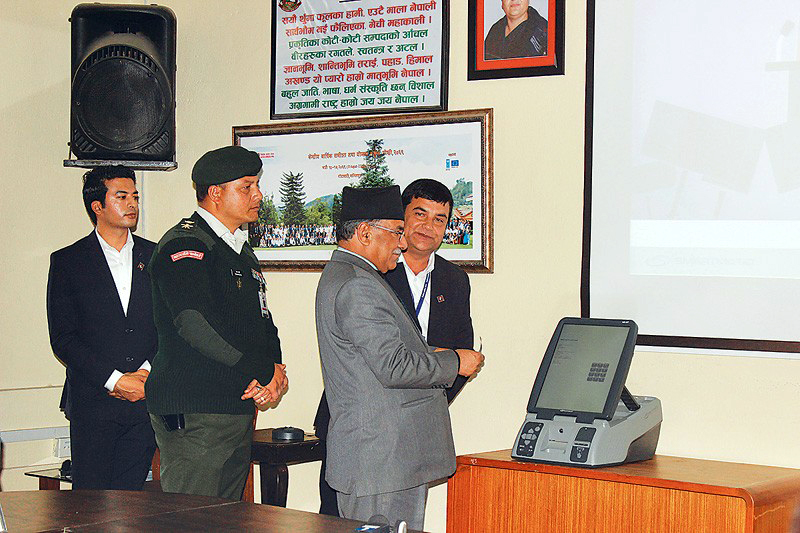Move follows controversy that the election body was in bid to buy the machines without competition
Kathmandu, February 16, 2017:Â The Election Commission (EC) has decided to stall the process of buying electronic voting machines (EVMs) from a London-based company for now. Instead, the EC has formed a taskforce led by Laxmi Yadav, chief of technical division of the EC, to study the viability of using the EVMs. The taskforce will also assess the costs of the equipment if they were to be bought from other companies.
The move to stall the EVM procurement process came after the EC plan ran into controversy.
Multiple sources at the EC said the taskforce was formed after questions were raised against the plan to award the contract to supply the EVMs to Smartmatic, a British company, without competition.
“The taskforce has been asked to study the viability of using the EVMs, companies that can supply EVMs, their costs and cost difference between using EVMs and the ballot papers,†said an EC official. Smartmatic has been in touch with the EC for the last few months. According to EC officials, it is the only company that has approached the EC so far.
Top officials of Smartmatic, including its chairman Lord Mark Malloch-Brown, on February 7 gave a demo on its EVMs to top leader, including Prime Minister Pushpa Kamal Dahal, at the EC office.
“At a time when the EC is yet to decide about using EVMs during local elections, the company’s chairman visiting Nepal and giving demo to party leaders suggests that something is cooking,†said a source at EC. While EVMs make the electoral process easy, voters need to be educated on time if they were to be used. A highly placed source at the EC told that there is no possibility of using EVMs in local elections now, as there is not enough time to educate voters about the machines.
Multiple sources claimed that Chief Election Commissioner Ayodhee Prasad Yadav made a visit to Singapore in mid-December to strike a deal with Smartmatic. The EC had not taken any formal decision regarding procuring EVMs, they said. The visit was described as personal. Smartmatic officials started visiting the EC only after that visit, they said. CEC Yadav refused to comment when enquired about EVMs. I have been speaking on matter on different forums, he said. But this is not the first time Smartmatic approached the EC.
According to a former election commissioner, the company had approached the EC before the Constituent Assembly elections. Then also the company had given a demo on its machines.
“We had allowed a Nepali company also to give a demo of its machine,†said the former commissioner. Indian EVMs also were considered for a while, but they could not be used because they could not adjust the large number of parties registered with the EC. Smartmatic Chairman Brown told journalists last week that its machine would cost $2-3 per voter. According to the EC, each election centre will have, on an average, 1,000 voters. It means the average cost of a machine will be $2,500. While using them in estimated 23,000 election centres, It would cost $57.50 million (Rs6.17 billion).
“Because of high value involved in purchasing the EVMs, efforts were made to purchase them from this company,†the source said.
Had the deal materialised, the British company’s local agent in Kathmandu—World Distribution Nepal Private Limited (WDN)—was supposed to manage software of the voting machine whose cost would be $1,000 per machine. Former chief election commissioner Nilkantha Upreti said that it was better to go for tender for such a large-scale procurement. “There is trend of purchasing election related materials directly when there is not enough time to call tender, but the EC has not yet made such a large-scale procurement through direct negotiations,†said Upreti.
By Prithvi Man Shrestha







